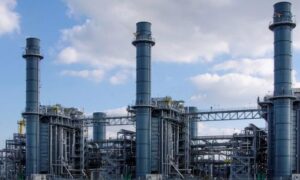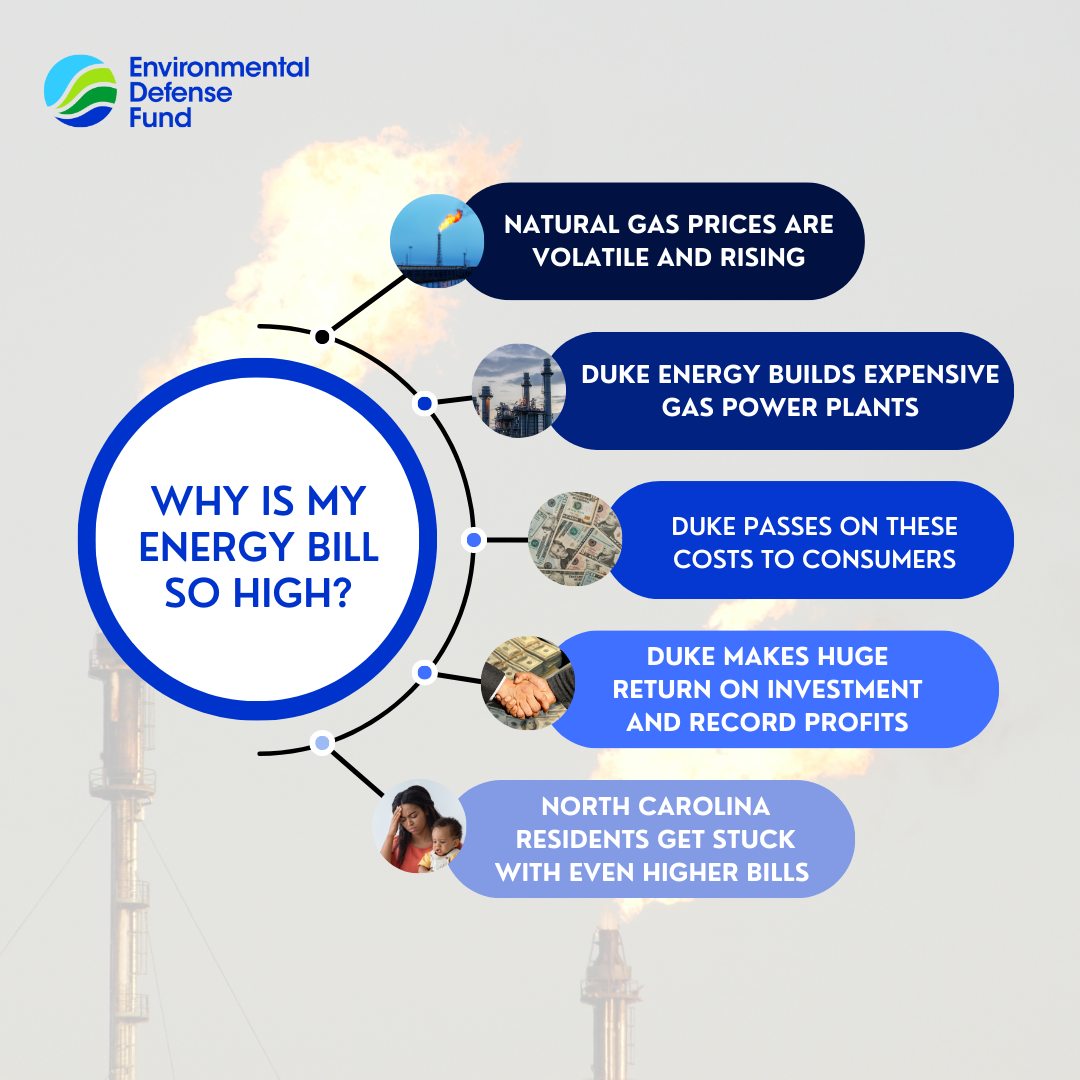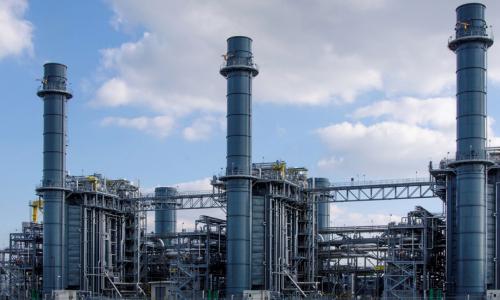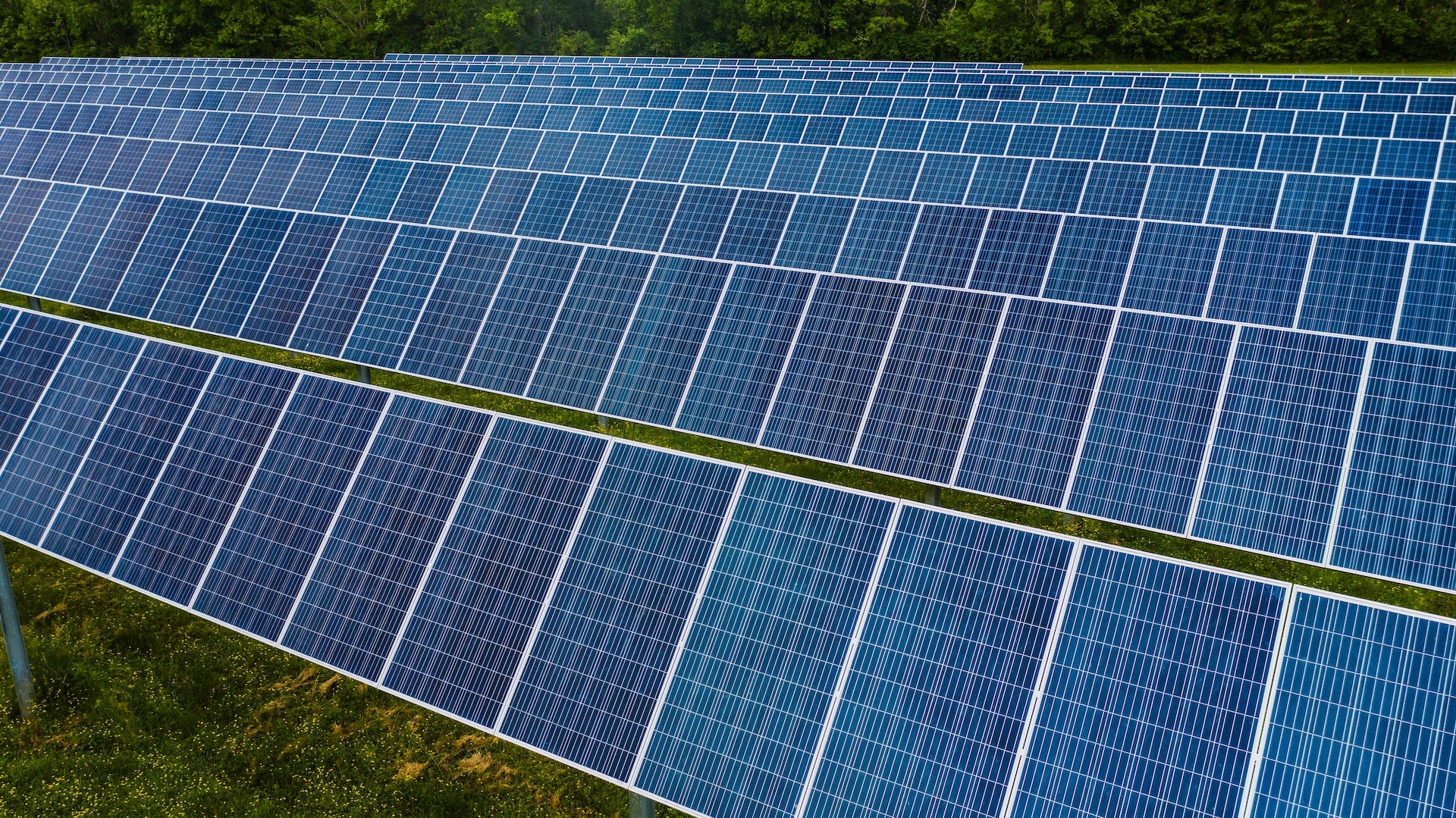
Duke Energy’s proposed investment in fossil fuels will leave customers with higher bills and more pollution
In the last few years, North Carolinians have seen eye-popping electricity bills. Bill increase after bill increase has compounded, resulting in 20+ percent higher monthly bills for most ratepayers in our state. The main driver? The volatile cost of natural gas, which accounts for a larger and larger portion of the energy mix that North Carolinians depend on.
And yet, instead of curbing use of a risk-intensive fuel source that has had such a detrimental effect on customers, Duke Energy is proposing a huge investment to build even more gas power plants. Why? State policy guarantees Duke a profitable return on investment for its spending on infrastructure like power plants. The more costly the investment, the higher the return for the company and its shareholders.
There’s no free market for electricity in North Carolina. With no meaningful competitor to provide customers the option to choose a different energy provider, Duke dominates the market and the company’s expensive investment plans are entirely in line with what should be expected from a profit-seeking monopoly utility taking advantage of a captive customer-base.
North Carolinians deserve the facts about Duke’s decisions, how it impacts their lives and how their leaders can protect them. Here’s what you should know:
Fact: Duke’s plan is all about gas, and gas is risky and expensive.
We all know that gas is dirty, but did you know that – especially recently – it’s been one of the most expensive fuel sources of all the options available to us? Volatility in gas prices from economic conditions, weather, and global markets exposes working families and small businesses here in North Carolina to price spikes and uncertainties we just can’t afford. There are clean, affordable, price-stable energy sources available, but Duke Energy, the biggest power provider in North Carolina, is planning to build even more gas plants. In fact, the company has proposed the second largest gas build-out of any utility in the country. If Duke’s proposals are approved, North Carolinians will experience the harmful consequences for our wallets, our health and our future.
Fact: Duke is inclined to build more gas because it’s expensive and the more they spend, the more they make. The current monopoly structure provides a powerful incentive to do just that.
Duke Energy surely realizes the burden they’re placing on their customers for choosing to rely on a fuel option that exposes them to price spikes and instability, so why make that choice? The short answer is it’s good for the company’s bottom line. When Duke builds and operates its gas plants, state policies provide a guaranteed rate of return on that investment and they are allowed to recover the costs of that build-out and their profits from their customers.
Duke invests a huge chunk of money up front to build expensive gas plants. They then charge customers for the cost of the new plant plus their guaranteed profits and the costs of the fuel to run it. And since Duke Energy is approved to operate in North Carolina as a monopoly utility, we have no reason to expect their motivations to change unless we change their incentives.
Fact: Duke has no skin in the game when it comes to what type of fuel powers their plants. Customers bear all the risk and all the cost.
Gas prices can fluctuate wildly and have been on the rise in recent years. Because this type of fuel is sold on a global market, its price is highly volatile as it’s impacted by global events and changes in demand from other countries. For customers who value stability and certainty, gas is an extremely risky fuel source to choose. And since the utility passes fuel costs directly along to its customers, it is precisely those customers – households and businesses – that bear the risks and uncertainties as fuel prices rise.
Fact: Natural gas prices rose, and clean energy costs dropped.
As gas prices have soared, the costs of clean energy – like wind, solar and solar & storage – have come down dramatically. In fact, the cost of solar has fallen some 90% in the last decade. And unlike gas, once solar panels are installed and wind turbines are spinning, there is zero fuel cost for ratepayers to incur because wind and sunshine are free. No global fuel markets for utilities to navigate. No unpredictable bill increases for North Carolinians to pay.
Fact: Fossil fuel failures caused the Christmas 2022 rolling blackouts
While Duke Energy will try to make the case that gas is needed to improve reliability, the blackouts more than half a million North Carolinians experienced during Christmas 2022 tell another story. In the company’s own testimony before the NC Utilities Commission in January 2023, executives squarely placed blame for the 2022 Christmas blackouts on the unreliability of its fossil fuel operations. The blackouts, as the utility testified, were in large part due to frozen fossil units and instrumentation, software failures, and technology glitches. The federal investigation of the blackout found that problems ran all the way up the gas supply chain, meaning that the reliability of Duke’s gas plants, and of power supply for North Carolinians, are increasingly vulnerable to disruption and reliant on factors beyond our control. For all of its expense, gas is not the beacon of reliability utilities would have us believe.
Fact: Gas is expensive and dirty, and that has a disproportionate impact on lower-income North Carolinians and communities of color.
Gas delivers a one-two punch to North Carolina families. In addition to draining the family budget, the effects of gas plants on North Carolinians’ well-being, particularly for the lower-income North Carolinians and communities of color which too often end up as neighbors to polluting power plants, is an increasingly critical health concern. Burning gas can result in toxic air pollution that contributes to serious health problems, especially respiratory illnesses, including childhood asthma. No parent wants their child to grow up playing outside in unhealthy air, but that fear may become a reality for even more families if Duke Energy’s proposal to build more gas plants is approved.
It shouldn’t be this way – North Carolina has tools to hold Duke accountable.
To protect customers from the inclinations of the profit-seeking monopoly, the NC Utilities Commission (NCUC) is tasked with holding Duke Energy accountable for their expenditures. The NCUC must approve the company’s proposed investments in capital-intensive projects like new power plants and the costs (including profit) for which the company wants its customers to pay. The NCUC is supposed to make sure Duke’s investments are reasonable, prudent, and in the public interest, so the utility doesn’t run amok billing customers for unnecessary, unreasonable and frivolous projects.
A relatively new state law, adopted with broad bipartisan support in 2021 (House Bill 951) also obligates the NC Utilities Commission to begin directing Duke’s investments toward projects that eliminate carbon pollution from the power sector. The law specifies the goal to achieve a 70% reduction in carbon pollution (from 2005 levels) by 2030 and to reach carbon neutrality by 2050. Duke’s current plans for one of the largest gas build-outs in the country promises exorbitant costs and far more pollution that neither customers nor the climate can afford.
The NCUC must take action, drawing a firm line between the path Duke Energy wants to take to boost profits versus the path that is best for customers. Duke’s path — a costly and risky focus on gas — will leave customers with higher bills and unhealthy air pollution. The better path, which the NCUC has the power to choose, is adopting a plan focused on energy sources that save customers money while reducing power-sector carbon pollution affordably and on time.
–
North Carolina families need reliable, low-cost clean energy we can count on. Gas, one of the dirtiest and most price-volatile fuel sources around, is not the solution.
North Carolina leaders have responded to calls from voters, adopting new laws to reduce pollution from power plants to better protect our people and our climate. Duke’s response has been to propose even greater investment in new polluting power plants that will keep our state and their customers financially tethered to a fossil fuel future. It’s time for the NCUC to reign in Duke Energy’s plans for a gas boondoggle, and get our state on a path that delivers an affordable, reliable, carbon-free future.














